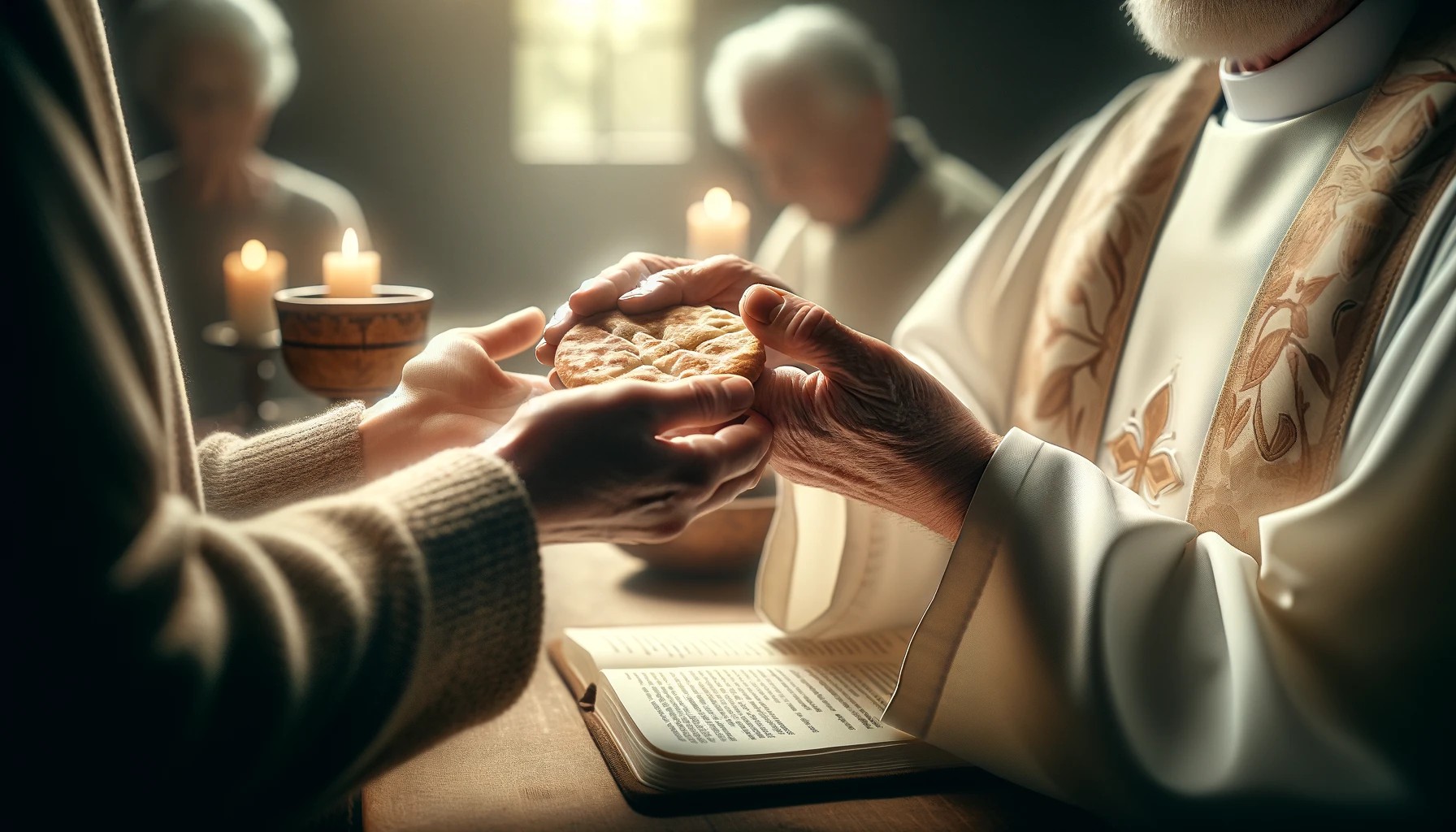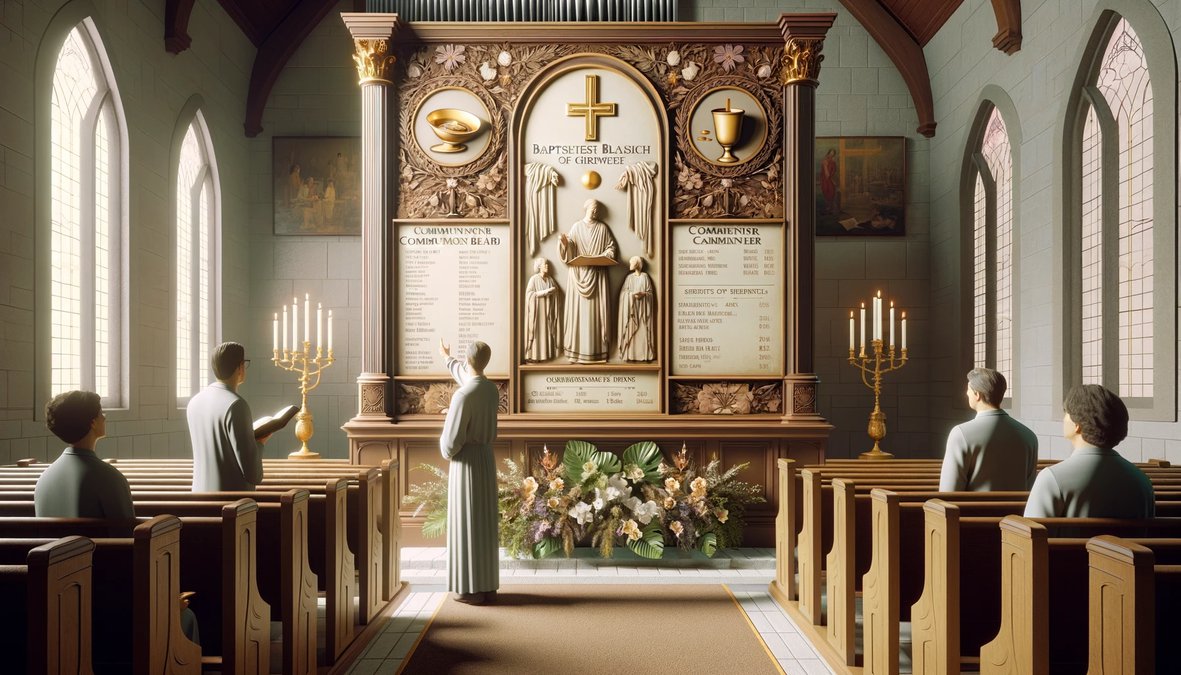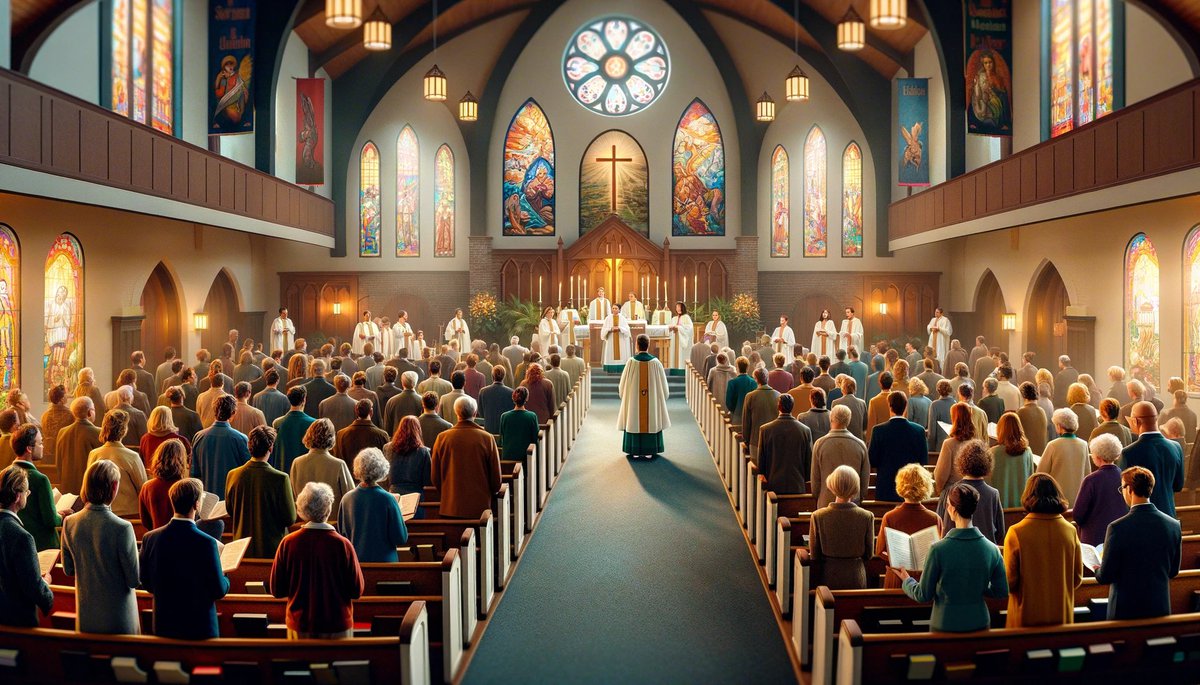Home>Theology and Spirituality>Why Do You Take Communion


Theology and Spirituality
Why Do You Take Communion
Published: February 19, 2024
Ericka Andersen, an editor at Christian.net, expertly merges digital strategy with content creation, focusing on faith and societal issues. Her communication skills enhance the platform's engaging narratives, fostering meaningful dialogue on belief's impact on society.
Explore the significance of taking communion in theology and spirituality. Discover the deeper meaning and purpose behind this sacred practice.
(Many of the links in this article redirect to a specific reviewed product. Your purchase of these products through affiliate links helps to generate commission for Christian.net, at no extra cost. Learn more)
Table of Contents
Introduction
Communion, also known as the Eucharist or the Lord's Supper, holds a profound significance in the Christian faith. It is a sacred ritual that has been practiced for centuries, serving as a cornerstone of Christian worship and spirituality. The act of taking communion is deeply rooted in the teachings of Jesus Christ and continues to be a central aspect of Christian gatherings and services.
Throughout history, communion has evolved into a rich and meaningful tradition, symbolizing the spiritual nourishment and unity of believers. Its essence goes beyond a mere religious custom; it embodies a spiritual connection and a tangible representation of the core beliefs of Christianity.
As we delve into the historical, symbolic, and spiritual dimensions of communion, we will uncover the profound reasons why this practice holds such a significant place in the hearts of believers. From its origins to its contemporary relevance, the exploration of communion unveils a tapestry of spiritual depth and communal devotion that transcends time and culture.
Read more: Why Do Catholics Take Communion
The Historical Significance of Communion
The historical significance of communion traces back to the last supper of Jesus Christ with his disciples. This pivotal event, which took place during the Passover feast, holds immense importance in Christian theology. As depicted in the New Testament, Jesus shared bread and wine with his disciples, instructing them to partake in remembrance of him. This act of sharing the bread as his body and the wine as his blood symbolized the impending sacrifice that Jesus would make for the redemption of humanity.
Following this significant gathering, the early Christian community continued the practice of communion as a central element of their worship. The Acts of the Apostles and the writings of the apostle Paul provide insights into how the early Christians celebrated the Lord's Supper, emphasizing its role in fostering unity and spiritual nourishment among believers.
Over the centuries, the ritual of communion evolved within the diverse traditions of Christianity, adapting to various cultural and theological contexts. The early church fathers, such as Ignatius of Antioch and Justin Martyr, documented the significance of communion in their writings, highlighting its centrality in the life of the Christian community.
During the medieval period, the theology of communion underwent profound theological reflection, leading to doctrinal discussions and debates within the church. The concepts of transubstantiation, consubstantiation, and memorialism emerged as theological frameworks to understand the nature of Christ's presence in the elements of bread and wine during the communion service.
The Protestant Reformation further shaped the historical significance of communion, with reformers such as Martin Luther, John Calvin, and Ulrich Zwingli offering distinct perspectives on the Eucharist. These theological debates and developments contributed to the diverse practices and beliefs surrounding communion within the spectrum of Christian denominations.
In contemporary times, the historical significance of communion continues to be upheld in various Christian traditions, serving as a unifying practice that connects believers to the foundational events of the faith. The rich historical tapestry of communion underscores its enduring importance as a sacred ritual that bridges the past, present, and future of Christian worship and spirituality.
The Symbolism of Communion
The act of communion is steeped in profound symbolism, encapsulating core elements of the Christian faith and serving as a tangible expression of spiritual truths. At its essence, communion embodies the multifaceted symbolism of nourishment, unity, remembrance, and anticipation.
Nourishment
The elements of bread and wine in communion symbolize spiritual nourishment. Just as physical food sustains the body, partaking in the bread and wine signifies the spiritual sustenance derived from the life and sacrifice of Jesus Christ. The act of consuming these elements represents the believer's dependence on Christ for spiritual nourishment and sustenance, reinforcing the intimate connection between the individual and the divine source of life.
Unity
Communion symbolizes the unity of believers within the body of Christ. As participants partake in the shared elements, they affirm their interconnectedness as members of the Christian community. This symbolism underscores the communal aspect of faith, emphasizing the bond of love and fellowship that unites believers across diverse backgrounds and experiences. The shared experience of communion fosters a sense of belonging and solidarity among believers, transcending individual differences and fostering a collective identity rooted in Christ.
Read more: Why Do Pentecostals Take Communion
Remembrance
Central to the symbolism of communion is the act of remembrance. As Jesus instructed his disciples to partake in remembrance of him during the last supper, communion serves as a commemoration of Christ's sacrificial death and resurrection. The symbolic nature of the bread and wine prompts believers to reflect on the redemptive work of Christ, acknowledging the profound significance of his sacrifice for the forgiveness of sins and the reconciliation of humanity with God. Through this act of remembrance, communion becomes a poignant expression of gratitude and reverence for the foundational events of the Christian faith.
Anticipation
Communion also carries the symbolism of anticipation, pointing to the future hope of the believer. The act of partaking in the Lord's Supper not only looks back to the historical events of Christ's sacrifice but also looks forward to the promised return of Christ. This forward-looking symbolism instills a sense of anticipation and longing for the fulfillment of God's redemptive plan, reminding believers of the ultimate hope found in the eschatological promise of Christ's second coming.
In essence, the symbolism of communion encompasses a rich tapestry of spiritual truths, encapsulating the themes of nourishment, unity, remembrance, and anticipation. This profound symbolism infuses the act of communion with deep spiritual significance, inviting believers to engage in a sacred practice that transcends time and space, connecting them to the foundational truths of the Christian faith.
The Spiritual Importance of Communion
The spiritual importance of communion extends far beyond a mere religious ritual; it encompasses profound significance in the spiritual journey of believers. At its core, communion serves as a sacred conduit for encountering the presence of Christ and experiencing spiritual transformation. This transcendent significance is rooted in the spiritual nourishment, communal unity, and intimate connection with the divine that communion offers to those who partake in this sacred practice.
Encounter with the Presence of Christ
Communion provides a unique opportunity for believers to encounter the living presence of Christ in a tangible and transformative manner. As participants partake in the bread and wine, they enter into a sacred communion with the person of Jesus Christ, experiencing his abiding presence in a deeply personal and spiritual way. This encounter transcends the physical elements of bread and wine, leading to a profound spiritual communion with the living Christ, fostering a sense of intimacy and spiritual renewal.
Read more: Why Do We Need To Take Communion
Spiritual Nourishment and Sustenance
The act of partaking in communion symbolizes the reception of spiritual nourishment and sustenance derived from the redemptive work of Christ. Just as physical food nourishes the body, the spiritual significance of communion lies in its capacity to nourish the soul and fortify the believer's faith. Through the shared elements of bread and wine, participants partake in the spiritual banquet of Christ's presence, finding sustenance for their spiritual journey and strength for the challenges they face in their daily lives.
Communal Unity and Fellowship
Communion serves as a powerful symbol of communal unity and fellowship within the body of Christ. As believers partake in the shared elements, they affirm their interconnectedness and shared identity as members of the Christian community. This communal aspect of communion fosters a sense of belonging, solidarity, and mutual support among believers, transcending individual differences and fostering a collective bond rooted in the love of Christ.
Intimate Connection with the Divine
Participating in communion fosters an intimate connection with the divine, allowing believers to draw near to God in a deeply personal and transformative way. The act of partaking in the Lord's Supper creates a sacred space for communion with the divine presence, enabling believers to experience a profound sense of closeness to God and a deepening of their spiritual relationship with the divine source of life.
In essence, the spiritual importance of communion lies in its capacity to facilitate a transformative encounter with the living presence of Christ, provide spiritual nourishment and sustenance, foster communal unity and fellowship, and cultivate an intimate connection with the divine. This spiritual depth and significance make communion a sacred practice that enriches the spiritual lives of believers and strengthens their faith journey.
The Personal Connection of Communion
The act of partaking in communion holds profound significance for individuals, fostering a deeply personal connection with the spiritual essence of the Christian faith. At its core, communion transcends the communal setting of a worship service and becomes an intimate encounter between the individual believer and the divine presence of Christ.
For each participant, communion represents a sacred moment of introspection and spiritual communion. As individuals approach the communion table, they bring with them their unique experiences, struggles, and aspirations. The act of receiving the bread and wine becomes a deeply personal expression of faith, surrender, and gratitude. In this moment, the individual's heart and soul are laid bare before the divine, creating a space for vulnerability, healing, and renewal.
The personal connection of communion extends beyond the physical consumption of the elements; it encompasses a spiritual communion with the living Christ. As individuals partake in the shared elements, they enter into a sacred encounter with the transformative love and grace of Jesus Christ. This intimate connection transcends the confines of time and space, allowing individuals to experience the abiding presence of Christ in a deeply personal and meaningful way.
Moreover, communion serves as a poignant reminder of the individual's identity as a beloved child of God. In the act of partaking, believers affirm their spiritual inheritance and their participation in the redemptive work of Christ. This affirmation of identity fosters a sense of belonging, acceptance, and divine purpose, grounding the individual in the assurance of God's unending love and grace.
Furthermore, the personal connection of communion extends to the realm of spiritual nourishment and renewal. As individuals partake in the elements, they receive spiritual sustenance for their journey of faith. The act of communion becomes a source of strength, comfort, and empowerment, equipping individuals to navigate the complexities of life with a renewed sense of hope and resilience.
In essence, the personal connection of communion transcends the boundaries of ritualistic observance, inviting individuals into a sacred space of encounter, transformation, and spiritual intimacy. This deeply personal dimension of communion enriches the spiritual lives of believers, nurturing a profound sense of connection with the divine and affirming the individual's place within the tapestry of God's redemptive love.
Conclusion
In conclusion, the practice of taking communion holds a timeless and profound significance within the Christian faith. From its historical roots in the last supper of Jesus Christ to its contemporary expression in diverse Christian traditions, communion embodies a rich tapestry of historical, symbolic, spiritual, and personal dimensions that resonate deeply with believers.
The historical significance of communion traces the trajectory of Christian worship and theology, reflecting the enduring legacy of the last supper and its impact on the early Christian community. Through the centuries, communion has evolved as a central ritual, shaping the theological discourse and communal practices of the church, underscoring its enduring relevance as a foundational aspect of Christian worship.
The symbolism of communion encapsulates the core tenets of the Christian faith, symbolizing nourishment, unity, remembrance, and anticipation. This rich symbolism infuses the act of communion with profound spiritual depth, inviting believers to engage in a sacred practice that transcends time and space, connecting them to the foundational truths of the Christian faith.
Furthermore, the spiritual importance of communion extends far beyond a religious ritual, offering believers a sacred conduit for encountering the living presence of Christ, experiencing spiritual transformation, and fostering communal unity and fellowship. The act of partaking in communion becomes a transformative encounter with the divine, providing spiritual nourishment and sustenance, fostering communal unity, and cultivating an intimate connection with the divine source of life.
Moreover, the personal connection of communion enriches the spiritual lives of individuals, fostering a deeply personal encounter with the transformative love and grace of Jesus Christ. This intimate connection transcends the confines of ritualistic observance, inviting individuals into a sacred space of encounter, transformation, and spiritual intimacy.
In essence, communion stands as a testament to the enduring legacy of the Christian faith, embodying a sacred practice that unites believers across time and space, fostering a deep sense of spiritual connection, and affirming the transformative power of Christ's redemptive love. As believers partake in communion, they are invited to embrace the historical, symbolic, spiritual, and personal dimensions of this sacred ritual, finding nourishment, unity, and spiritual renewal in the abiding presence of Christ.












